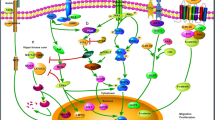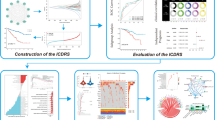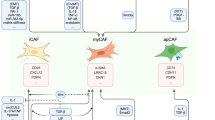Abstract
CD74 was initially thought to participate mainly in antigen presentation as an MHC class II chaperone. Recent studies have shown that CD74 plays an important role within the cell and throughout the immune system in a wide spectrum of neoplasms. However, the role of CD74 in hepatocellular carcinoma (HCC) remains elusive. In this study, HCC tissues from Zhongshan Hospital and data from The Cancer Genome Atlas (TCGA) were obtained and analyzed. Immunohistochemistry, flow cytometry, and single-cell RNA sequencing (scRNA-seq) were performed to detect the characteristics of CD74+ cells and explore their impact on the tumor microenvironment (TME) of HCC. Our data revealed that stromal CD74+ cell enrichment was associated with favorable prognosis in patients with HCC. CD74 was abundant in a large portion of HCC specimens and prominently distributed on stromal macrophages. scRNA-seq data also indicated that the pathways related to immune response were significantly upregulated in CD74+ macrophages. High infiltration of CD74+ macrophages was associated with increased infiltration of CD8+ cytotoxic T lymphocytes (CTLs) with enhanced effector functions in HCC. Besides, blocking CD74 weakened the antitumor activity and proliferation ability of CD8+ CTLs in HCC. Our findings highlight the critical role of CD74 in HCC. New drugs and antibodies targeting CD74 may be effective strategies for HCC therapy.






Similar content being viewed by others
Data availability
Data are available upon reasonable request.
Change history
17 April 2023
Missing supplementary tables and figures have been included
Abbreviations
- CI:
-
Confidence interval
- CTL:
-
Cytotoxic T lymphocyte
- GO:
-
Gene Ontology
- GSEA:
-
Gene set enrichment analysis
- HR:
-
Hazard ratio
- HCC:
-
Hepatocellular carcinoma
- OS:
-
Overall survival
- RFS:
-
Recurrence-free survival
- scRNA-seq:
-
Single-cell RNA sequencing
- TCGA:
-
The Cancer Genome Atlas
- TME:
-
Tumor microenvironment
References
Siegel R, Miller K, Jemal A (2020) Cancer statistics. CA Cancer J Clin 70:7–30. https://doi.org/10.3322/caac.21590
Bertuccio P, Turati F, Carioli G, Rodriguez T, La Vecchia C, Malvezzi M, Negri E (2017) Global trends and predictions in hepatocellular carcinoma mortality. J Hepatol 67:302–309. https://doi.org/10.1016/j.jhep.2017.03.011
Villanueva A (2019) Hepatocellular Carcinoma. N Engl J Med 380:1450–1462. https://doi.org/10.1056/NEJMra1713263
Forner A, Reig M, Bruix J (2018) Hepatocellular carcinoma. Lancet 391:1301–1314. https://doi.org/10.1016/s0140-6736(18)30010-2
Fridman WH, Pagès F, Sautès-Fridman C, Galon J (2012) The immune contexture in human tumours: impact on clinical outcome. Nat Rev Cancer 12:298–306. https://doi.org/10.1038/nrc3245
Angell H, Galon J (2013) From the immune contexture to the Immunoscore: the role of prognostic and predictive immune markers in cancer. Curr Opin Immunol 25:261–267. https://doi.org/10.1016/j.coi.2013.03.004
Rizvi S, Wang J, El-Khoueiry AB (2020) Liver cancer immunity. Hepatology. https://doi.org/10.1002/hep.31416
Borghese F, Clanchy FI (2011) CD74: an emerging opportunity as a therapeutic target in cancer and autoimmune disease. Expert Opin Ther Targets 15:237–251. https://doi.org/10.1517/14728222.2011.550879
Schröder B (2016) The multifaceted roles of the invariant chain CD74–More than just a chaperone. Biochim Biophys Acta 1863:1269–1281. https://doi.org/10.1016/j.bbamcr.2016.03.026
Starlets D, Gore Y, Binsky I, Haran M, Harpaz N, Shvidel L, Becker-Herman S, Berrebi A, Shachar I (2006) Cell-surface CD74 initiates a signaling cascade leading to cell proliferation and survival. Blood 107:4807–4816. https://doi.org/10.1182/blood-2005-11-4334
Merk M, Zierow S, Leng L et al (2011) The D-dopachrome tautomerase (DDT) gene product is a cytokine and functional homolog of macrophage migration inhibitory factor (MIF). Proc Natl Acad Sci U S A 108:E577–E585. https://doi.org/10.1073/pnas.1102941108
Leng L, Metz CN, Fang Y et al (2003) MIF signal transduction initiated by binding to CD74. J Exp Med 197:1467–1476. https://doi.org/10.1084/jem.20030286
Nagata S, Jin YF, Yoshizato K et al (2009) CD74 is a novel prognostic factor for patients with pancreatic cancer receiving multimodal therapy. Ann Surg Oncol 16:2531–2538. https://doi.org/10.1245/s10434-009-0532-3
Shachar I, Haran M (2011) The secret second life of an innocent chaperone: the story of CD74 and B cell/chronic lymphocytic leukemia cell survival. Leuk Lymphoma 52:1446–1454. https://doi.org/10.3109/10428194.2011.565437
Berkova Z, Tao RH, Samaniego F (2010) Milatuzumab - a promising new immunotherapeutic agent. Expert Opin Investig Drugs 19:141–149. https://doi.org/10.1517/13543780903463854
Lin C, He H, Liu H et al (2019) Tumour-associated macrophages-derived CXCL8 determines immune evasion through autonomous PD-L1 expression in gastric cancer. Gut 68:1764–1773. https://doi.org/10.1136/gutjnl-2018-316324
Qi Y, Chang Y, Wang Z et al (2019) Tumor-associated macrophages expressing galectin-9 identify immunoevasive subtype muscle-invasive bladder cancer with poor prognosis but favorable adjuvant chemotherapeutic response. Cancer Immunol, Immunother : CII 68:2067–2080. https://doi.org/10.1007/s00262-019-02429-2
Fu Q, Xu L, Wang Y et al (2019) Tumor-associated macrophage-derived interleukin-23 interlinks kidney cancer glutamine addiction with immune evasion. Eur Urol 75:752–763. https://doi.org/10.1016/j.eururo.2018.09.030
Adeegbe DO, Liu Y, Lizotte PH et al (2017) Synergistic immunostimulatory effects and therapeutic benefit of combined histone deacetylase and bromodomain inhibition in non-small cell lung cancer. Cancer Discov 7:852–867. https://doi.org/10.1158/2159-8290.cd-16-1020
Chen X, Chang CH, Stein R, Cardillo TM, Gold DV, Goldenberg DM (2013) Prevention of acute graft-versus-host disease in a xenogeneic SCID mouse model by the humanized anti-CD74 antagonistic antibody milatuzumab. Biol Blood Marrow Transplant 19:28–39. https://doi.org/10.1016/j.bbmt.2012.09.015
Stein R, Qu Z, Cardillo TM, Chen S, Rosario A, Horak ID, Hansen HJ, Goldenberg DM (2004) Antiproliferative activity of a humanized anti-CD74 monoclonal antibody, hLL1, on B-cell malignancies. Blood 104:3705–3711. https://doi.org/10.1182/blood-2004-03-0890
Stein R, Smith MR, Chen S, Zalath M, Goldenberg DM (2009) Combining milatuzumab with bortezomib, doxorubicin, or dexamethasone improves responses in multiple myeloma cell lines. Clin Cancer Res 15:2808–2817. https://doi.org/10.1158/1078-0432.Ccr-08-1953
Camp R, Dolled-Filhart M, Rimm D (2004) X-tile: a new bio-informatics tool for biomarker assessment and outcome-based cut-point optimization. Clin Cancer Res: Official J Am Assoc Cancer Res 10:7252–7259. https://doi.org/10.1158/1078-0432.ccr-04-0713
McClelland M, Zhao L, Carskadon S, Arenberg D (2009) Expression of CD74, the receptor for macrophage migration inhibitory factor, in non-small cell lung cancer. Am J Pathol 174:638–646. https://doi.org/10.2353/ajpath.2009.080463
Tian B, Zhang Y, Li N, Liu X, Dong J (2012) CD74: a potential novel target for triple-negative breast cancer. Tumour Biol : J Int Soc Oncodevelopmental Biol Med 33:2273–2277. https://doi.org/10.1007/s13277-012-0489-x
Forero A, Li Y, Chen D et al (2016) Expression of the MHC class II pathway in triple-negative breast cancer tumor cells is associated with a good prognosis and infiltrating lymphocytes. Cancer Immunol Res 4:390–399. https://doi.org/10.1158/2326-6066.cir-15-0243
Zeiner P, Zinke J, Kowalewski D et al (2018) CD74 regulates complexity of tumor cell HLA class II peptidome in brain metastasis and is a positive prognostic marker for patient survival. Acta Neuropathol Commun 6:18. https://doi.org/10.1186/s40478-018-0521-5
Otterstrom C, Soltermann A, Opitz I, Felley-Bosco E, Weder W, Stahel R, Triponez F, Robert J, Serre-Beinier V (2014) CD74: a new prognostic factor for patients with malignant pleural mesothelioma. Br J Cancer 110:2040–2046. https://doi.org/10.1038/bjc.2014.117
Wang ZQ, Milne K, Webb JR, Watson PH (2017) CD74 and intratumoral immune response in breast cancer. Oncotarget 8:12664–12674. https://doi.org/10.18632/oncotarget.8610
Perez S, Kallinteris N, Bisias S et al (2010) Results from a phase I clinical study of the novel Ii-Key/HER-2/neu(776–790) hybrid peptide vaccine in patients with prostate cancer. Clin Cancer Res : An Off J Am Assoc Cancer Res 16:3495–3506. https://doi.org/10.1158/1078-0432.ccr-10-0085
Govindan S, Cardillo T, Sharkey R, Tat F, Gold D, Goldenberg D (2013) Milatuzumab-SN-38 conjugates for the treatment of CD74+ cancers. Mol Cancer Ther 12:968–978. https://doi.org/10.1158/1535-7163.mct-12-1170
Coffelt SB, de Visser KE (2015) Immune-mediated mechanisms influencing the efficacy of anticancer therapies. Trends Immunol 36:198–216. https://doi.org/10.1016/j.it.2015.02.006
Fridman WH, Zitvogel L, Sautès-Fridman C, Kroemer G (2017) The immune contexture in cancer prognosis and treatment. Nat Rev Clin Oncol 14:717–734. https://doi.org/10.1038/nrclinonc.2017.101
Funding
This work was supported by the Leading Investigator Program of the Shanghai municipal government (17XD1401100), the National Key Basic Research Program (973 Program; 2015CB554005) from the Ministry of Science and Technology of China, and the National Natural Science Foundation of China (81672326 and 81871928). All these study sponsors have no roles in the study design, collection, analysis and interpretation of data.
Author information
Authors and Affiliations
Contributions
N Xiao and K-S Li were responsible for the acquisition, statistical analysis, and interpretation of the data, and the drafting of the manuscript. H-C Sun was responsible for the conception and design of the study, analysis and interpretation of data, drafting of the manuscript, obtainment of funding and study supervision. X-D Zhu, B Xu, X-F Liu, and M Lei were responsible for technical and material support. All authors read and approved the final manuscript.
Corresponding author
Ethics declarations
Conflict of interest
The authors declare no conflict of interest.
Ethics approval
The study followed the Declaration of Helsinki and was approved by the Clinical Research Ethics Committee of Zhongshan Hospital, Fudan University.
Consent to participate
Signed informed consent was obtained from each patient.
Consent for publication
All authors provide their consent for publication of the manuscript.
Additional information
Publisher's Note
Springer Nature remains neutral with regard to jurisdictional claims in published maps and institutional affiliations.
Supplementary Information
Below is the link to the electronic supplementary material.
Rights and permissions
Springer Nature or its licensor (e.g. a society or other partner) holds exclusive rights to this article under a publishing agreement with the author(s) or other rightsholder(s); author self-archiving of the accepted manuscript version of this article is solely governed by the terms of such publishing agreement and applicable law.
About this article
Cite this article
Xiao, N., Li, K., Zhu, X. et al. CD74+ macrophages are associated with favorable prognosis and immune contexture in hepatocellular carcinoma. Cancer Immunol Immunother 71, 57–69 (2022). https://doi.org/10.1007/s00262-021-02962-z
Received:
Accepted:
Published:
Issue Date:
DOI: https://doi.org/10.1007/s00262-021-02962-z




